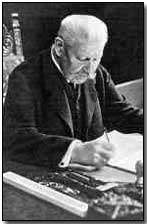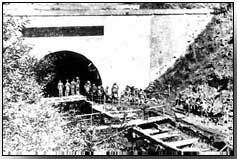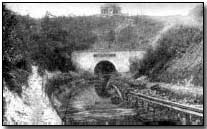Memoirs & Diaries - Retreating to the Hindenburg Line
 It looked like a
house-moving of humble folk - mattresses and chairs, with an occasional
sewing-machine or hen-coop, and then a fine array of dismantled doors and
windows and anything else that seemed worth carrying away from the houses
that a few hours later were to go up in smoke and flames. And they
sawed away tree trunks - fine, sound, solid wood.
It looked like a
house-moving of humble folk - mattresses and chairs, with an occasional
sewing-machine or hen-coop, and then a fine array of dismantled doors and
windows and anything else that seemed worth carrying away from the houses
that a few hours later were to go up in smoke and flames. And they
sawed away tree trunks - fine, sound, solid wood.
And the desert, a pitiful desert leagues wide, bare of trees and undergrowth and houses! They sawed and hacked; trees fell and bushes sank; it was days and days before they had cleared the ground. In this war zone there was to be no shelter, no cover.
The enemy's mouth must stay dry, his eyes turn in vain to the wells - they are buried in rubble. No four walls for him to settle down into; all levelled and burnt out, the villages turned into dumps of rubbish, churches and church towers laid out in ruins athwart the roads.
Smouldering fires and smoke and stench; a rumble spreading from village to village - the mine charges are still doing their final work, which leaves nothing more to do.
It is not so easy to scatter a whole village into brick-dust. There are hundreds of villages out there which were under fire for weeks on end, yet still showed a wall or two and an occasional roof. But when our engineers get to work on a village, our engineers! Then it goes into the air as if a mighty earthquake had caught it, it crumbles and breaks up and falls, and the last pitiful houses are knocked out by the coup de grace.
And what a rubbish-heap there lies spread - bricks and clay and stones and timbers licked by the flames. Poor devil of a war zone, seek your habitation elsewhere! Old-time farms with massive walls, vaulting, and any amount of resisting power - their walls were drilled scientifically, and the charges fired. Then the whole farm crumpled up, just as it was intended to do - half over the road which it was its business to bury, and the other half into the cracking cellars.
 Rubble,
nothing but rubble, all this ancient village history, all these future
prospects of modern peasant life. The fine broad yard sinks away with
the cottage; the cottage burns quietly to ashes, and the remains of its clay
walls yield to the first serious stroke of the battering-ram. The
great farm buildings put up a defence - only to fly into the air, rain down
again, and mingle themselves with their neighbours' misery in a field of
ruins which once bore a name and paid a rent.
Rubble,
nothing but rubble, all this ancient village history, all these future
prospects of modern peasant life. The fine broad yard sinks away with
the cottage; the cottage burns quietly to ashes, and the remains of its clay
walls yield to the first serious stroke of the battering-ram. The
great farm buildings put up a defence - only to fly into the air, rain down
again, and mingle themselves with their neighbours' misery in a field of
ruins which once bore a name and paid a rent.
Let them see it over there! Let them see it over there! This fearful naked war should be reflected in all the shop windows of the Boulevards. We have put distance between us and our enemies. It is a desert full of wretchedness.
Farewell, comrades of the Somme! The earth which drank your blood is upheaved and torn asunder. It is made unfruitful, it is turned into a desert, and your graves are made free from the dwellings of men. Those who tread it, your desert, will be greeted by our shells.
Till the last moment the exploding platoons remained in the towns and villages to finish the work of destruction, and then fight their way back the best they could. The general system of retreat was something marvellous. Every detachment knew exactly which way to turn. Every column had its way prescribed, and, despite this gigantic movement of man, beast and truck, there were no blockades, no congestion anywhere, all arriving exactly at the prescribed hour.
Messengers rode about to notify the different commands of the time to start, while at the same time gigantic motor cars distributed enormous quantities of explosives to the pioneer platoons.
Wherever possible, without attracting the special attention of the natives or the Allies, houses were burned down days before the evacuation. Walls that would not fall were exploded when the Allies were in the heat of an artillery fight, suggesting the tremendous effect of their fire. These preparations took many days, but toward the end heavy fogs in the mornings and cloudy atmosphere in the afternoons permitted the burning of villages without concealment.
 And
to think, the Allies never had the slightest idea of what was going on!
They never interfered with the German plans of destruction, and never
thought of shelling the German lines of communication, while endless columns
marched over them. The last I saw was German machine-gun platoons
disappearing among the ruins and German patrols taking what little part was
left to await the Allies.
And
to think, the Allies never had the slightest idea of what was going on!
They never interfered with the German plans of destruction, and never
thought of shelling the German lines of communication, while endless columns
marched over them. The last I saw was German machine-gun platoons
disappearing among the ruins and German patrols taking what little part was
left to await the Allies.
Slowly, with enormous losses, the hostile hordes are now feeling their way through the dangers lurking all about them.
The country behind the allied trenches had been covered with a great network of railways and roads for heavy mortars which would enable them to move divisions and army corps with lightning speed and so concentrate unexpectedly on any weak spot of the German line they might discover while shamming a general attack along the whole front.
Day after day German flyers watched the mountains of ammunition and provisions pile up at the British base, to which well-metalled white roads reached out from the trenches like tentacles of some ghastly monster to suck in the whole world for slaughter and destruction.
Billions of dollars' worth of material, iron, wood, and cement, and the labour of a vast army was sunk in this ground between the British trenches and the base. All these gigantic preparations were conducted with truly English naiveté, for any other nation would have told itself that flyers watching them day by day would have long ago supplied the German General Staff with very exact data of what was going on.
Then all of a sudden mysterious movements began on the German side. Soldiers taking with them their kits and all other belongings, left the trenches and dugouts. The mountains of munitions grew rapidly less by the efforts of many hundreds of huge mortar carriers, of wagons drawn by eight horses, streaming incessantly, day and night, over the groundless roads which nobody now thought of repairing any more.
 Whole
villages disappeared overnight, their inhabitants being concentrated in a
few singled-out towns and places where they were comparatively safe and from
where they might easily reach their own people when the time would come.
Of bush and trees, nothing was left standing that might serve the Allies as
cover.
Whole
villages disappeared overnight, their inhabitants being concentrated in a
few singled-out towns and places where they were comparatively safe and from
where they might easily reach their own people when the time would come.
Of bush and trees, nothing was left standing that might serve the Allies as
cover.
Even the belongings were removed from the houses before the latter were levelled to the ground. Night after night the artillery rolled back in an endless chain, followed by regiment after regiment of silent grey war lords.
Small troops armed with machine guns remained behind, however, and kept up a sham of trench war. So well did they succeed in deceiving the British that they often drew the British heavy guns to furious bombardments of what was already a deserted strip of land.
Behind their new positions, ten to fifteen kilometres back, the Germans chuckled when they read in the British reports of the explosions of German munition magazines caused by the never-failing British gunfire. They knew only too well that another village had been levelled, another bridge blown up by the astute German pioneers.
When finally the British hesitatingly felt their way into what were once the German lines, they discovered between the Oise and Arras a lifeless chaos which baffled all their zealous preparation of many months for the deadly blow that would now fall on the air.
Source: Source Records of the Great War, Vol. V, ed. Charles F. Horne, National Alumni 1923
Photographs courtesy of Photos of the Great War website.
"Boche" was a disparaging term used to describe anything German.
- Did you know?
